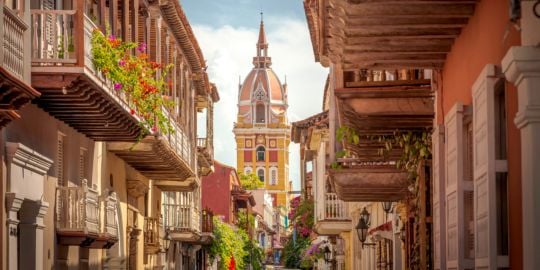I would love to learn more about the Colombian culture.
Colombian culture
Hello Dave2222,
Welcome to the Colombia forum 
Maybe you could introduce yourself so as to get acquainted with members of this forum who might give you some feedback. 
Do you plan to go to Colombia?
You may read the different topics in the Everyday life in Colombia category of the forum so as to gather some infos about the Colombian culture.
Cheers,
Bhavna
Dave2222 wrote:I would love to learn more about the Colombian culture.
It's a subject that is better learned by visiting there, than can be easily explained. This link is a good start:
https://en.wikipedia.org/wiki/Colombian_culture
I have a window into the culture, having been going there for about 20 years, and being married to a colombiana who has 8 siblings. But I still do not understand more than a fraction of daily life there.
Of the 9 adult children in my wife's immediate family, 5 are male and 4 are female. Two of the four females are married, one with one child. One female is in a long-term relationship. Three of the five males are married, with six children total. One of the males is in a long-term relationship. My wife's mother, two sisters and a brother all live together in one home in Cali. The other family members live elsewhere in Cali, and in Buenaventura and Bogotá. The father is absent and has been so for decades. This is not an uncommon situation, unfortunately, in Colombia.
It's not unusual in Colombia to encounter large families although that trend is lessening. It's also not unusual for adult children to live with their parents. My wife's family is very close, closer than normal I think, and it's not unusual for them to get together in large numbers, more than several dozen, with cousins, aunts and uncles, and friends, every chance they get. They are aided in this in that Colombia has 18-20 official holidays, some cities celebrating days others may not, and they are often structured as a "puente" meaning the holiday is on a Monday to make an extra-long weekend. Colombians in general like to party, to eat and drink and dance. "Seize the day!" is something Colombians understand perfectly. Overall it is a family-oriented culture, as much or more so than we see in the US.
Many Colombians are devoted to the city where they live and tend to identify at a city level as much or more than a national level. Each city can have its own character, its own way of speaking, its own specialties of events and cuisine. This is due at least in part because for a long time, travel was difficult in the mountainous terrain. It still may take perhaps twice as long or more to go a certain distance by land, as it would here in the US.
It also can take twice as long or more, to do everyday things like grocery shopping, or with anything having to do with licensing, permits, any and every type of bureaucracy being much more complicated and time-consuming than here in the US.
In general life is not as hurried or rushed. Most Colombians are not punctual - it is not seen as a virtue, nor is it a vice to be late.
Colombians are by and large religious but not overly so. The idea of separation of church and state is foreign to them. Although Colombia has many elements of socialism in its government, no one expects the government to do much for them - mainly because corruption is still quite widespread. Also because it is a relatively poor country compared to the "first world", and also because the government simply has not expanded into many areas so the people are on their own for more things. So Colombians have a realistic expectation of what government can and cannot do. They are astounded that our country actually pays people not to work. What some call "moral decay" in our country, has for the most part not yet reached Colombia - to the outsider many ordinary Colombians appear to be hard-working, humble, unpretentious people of faith, who no matter their circumstances, are just trying to live their lives peacefully and productively.
Poverty is widespread with "income inequality" being very noticeable. The state-established minimum salary for 2015 is some 644,350 Colombian pesos per month which is about $234 USD at today's exchange rate. And only about half of the population makes even that much. There is both "formal" and "informal" work and only formal employment is covered by the minimum wage. You see very few outright beggars however - instead you see poor people trying to earn money by selling fruit, cold drinks, performing tricks etc. at stop lights, people hailing cabs for you, just for any small change you may give them. Again, this is because they know the government isn't going to do anything for them, they realize they have to do it for themselves - or starve. Poverty here is not like in the US - poor people in Colombia do not have a car, a cell phone, a TV, expensive sneakers, etc. etc. and do not receive food stamps or anything from the government - there is no "safety net", or if there is, it's obviously not working...
In spite of the problems, life is not hard (unless you are really poor). The climate is cool only at higher altitudes. Mostly you just need a place to get out of the rain. Many Colombians have a somewhat fatalistic attitude towards life, caused I think by many decades of violence starting in the 1950s, followed by the drug cartels, guerrillas, kidnappings and the general high level of crime in many areas - but they hang in there, "Tenaz, tenaz!" is a common expression. Overall my impression is that Colombians are a happy and friendly people, a good people, and that the country is headed in the right direction for growth and prosperity - but it's still like a mountain journey, twisted and tortuous with many ups and downs.









